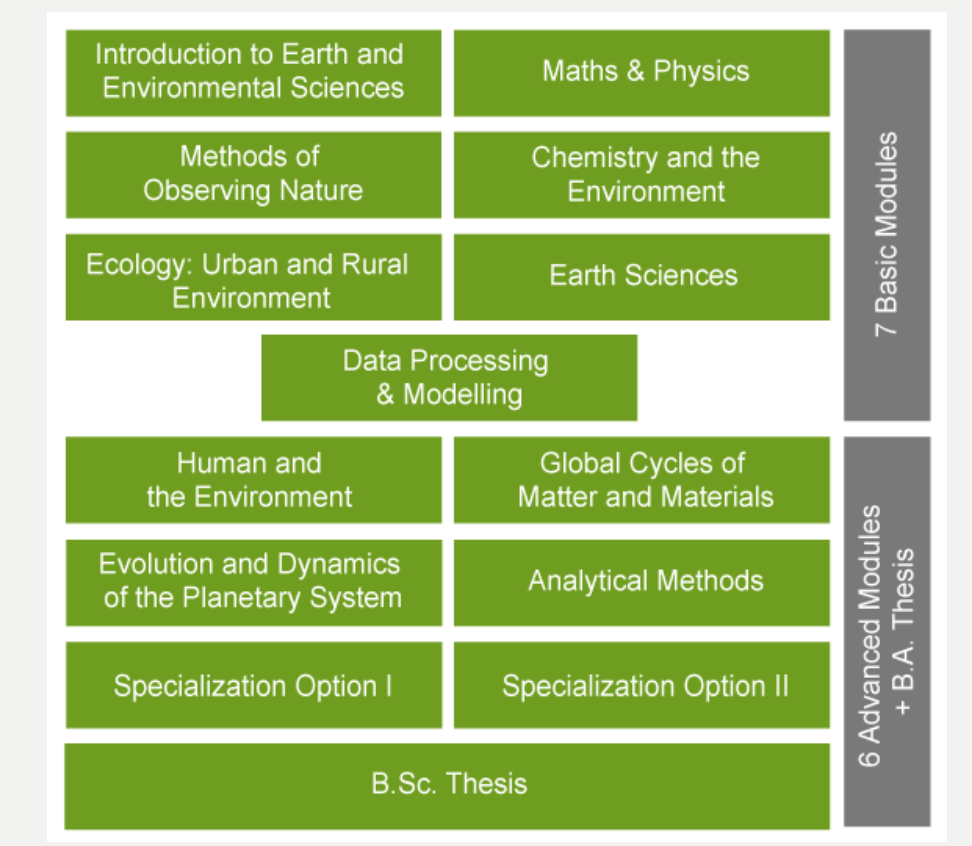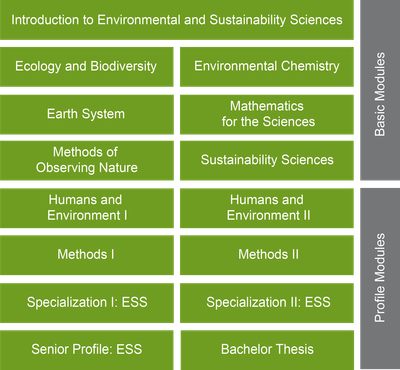The major consists of a host of modules. You “check off” modules as your studies advance by taking courses which fit the module requirements. For some modules, there is only one corresponding course. These tend to be the basic modules and the respective courses are also obligatory for all EES students. Then there are advanced modules. In order to meet the requirements for these modules, you can choose from a variety of courses and start shaping the major according to your personal interests. Module descriptions are particularly helpful when you want to check whether external classes (either at University of Freiburg or at your host university abroad) would match EES module requirements at UCF.
The following chart provides an overview of the content of all basic and advanced modules in the Earth and Environmental Sciences (StuPO 2015) and Environmental and Sustainability Sciences (StuPO 2020) Major. The most recent, detailed module descriptions can be found online.

StuPO 2015 
StuPO 2020
If you are wondering how to fill your advanced modules and want to get a glimpse of which courses are behind the basic modules, you can find a preliminary compilation of matched courses and modules here.
| Module StuPO 2015 | StuPO 2020 | Course |
|---|---|---|
| Introduction to EES | Introduction to ESS | Introduction to EES |
| Maths and Physics | Mathematics for the Sciences | Maths & Physics |
| Chemistry and the Environment | Environmental Chemistry | Environmental Chemistry |
| Evolution and Dynamics of the Planetary System | — | The Earth in the Universe |
| Earth Science | Earth System | Georesources |
| Methods of Observing Nature | Methods of Observing Nature | Natural Heritage Interpretation |
| Data Processing & Modelling | Methods I | Computational Modeling |
| Ecology: Urban and Rural Environment | Ecology and Biodiversity | Ecology: From Genetic Adaptations to Communities | Concepts of Ecology and Nature Conservation | Science and Practice of Sustainable Gardening |
| Global Cycles of Matter and Materials | Sustainability Science | Resources and Sustainability | Mediated Modelling for Sustainability |
| Humans and the Environment | Humans and the Environment I and II | Environmental Psychology | Energy Policy | Urban Environmental Planning | Environment, Risks, and Us | History and Environment | Natural Resource Policy and Environmental Governance Studies | An Anthropology of Things: Interdisciplinary Approaches to the Environment |
| Analytical Methods | Methods II | Geographic Information Systems | Biodiversity Loss and Entomology | Urban Interventions |
| Specialisation Option I and II | Specialisation Option I and II | all above advanced courses and e.g. Climate Change and Biodiversity | Energy Technology | Energy Storage | Grid Integration | Solar Energy |Photovoltaic Lab | Emerging & Future Photovoltaic Options | Environmental Controversies | Resilienz & Kollaps ökologisch-ökonomischer Systeme |Fundamentals of Resilience |Material Life Cycles | Design and Monitoring of Large Infrastructures |
Additionally, you also have to fulfill core modules – but don´t worry; almost half of the core modules will already be covered in the foundational (1st) year. The only modules that are not part of the foundational year are Research Design across Disciplines, Theory of Science, Science in Context and Responsibility and Leadership II. Therefore, you will have to fulfill those modules within the years 2-4.

StuPO 2015 
StuPO 2020